Are Tottenham Hotspur better without Harry Kane?
In the most literal sense: yes, they are. Last year, Tottenham averaged 1.6 points per game. This season, Tottenham are averaging 2.6 points per game. Harry Kane played for Tottenham last season. This season, Harry Kane plays for Bayern Munich. Without Harry Kane, Tottenham are better. This is objectively true.
It's also absurd. Tottenham are not better because they're without Harry Kane. In 10 Bundesliga starts so far this season, Kane has scored 15 goals and added five assists. Those 20 goal contributions are more than Erling Haaland, Kylian Mbappé ... and every other player in Europe's Big Five leagues. Strip out the three penalties, and still: no one has contributed to more goals. Only Stuttgart's Serhou Guirassy can match Kane's output.
It's pretty simple. The whole point of soccer is to create more goals than the other team, and Kane has created more goals than anyone else in Europe. Every team would be better with Harry Kane.
After Saturday's 4-0 Der Klassiker win over Borussia Dortmund, let's take a look at how he's made Bayern Munich better, and how they've done the same to him. Here's why Harry Kane made the difference on Saturday.
Yes, Bayern Munich are better with Harry Kane
Back to that idea of keeping things simple. Last season, Bayern Munich were one of the best teams in the world. Their Champions League tie with Manchester City wasn't as lopsided as it looked, and although they needed Dortmund to trip right before the finish line in order to secure their 10th-straight league title, they were still quite clearly the best team in the league. Their non-penalty goal differential was plus-60 -- Dortmund were second on plus-36 -- and their non-penalty expected goals (xG) differential was way ahead of the pack, too.
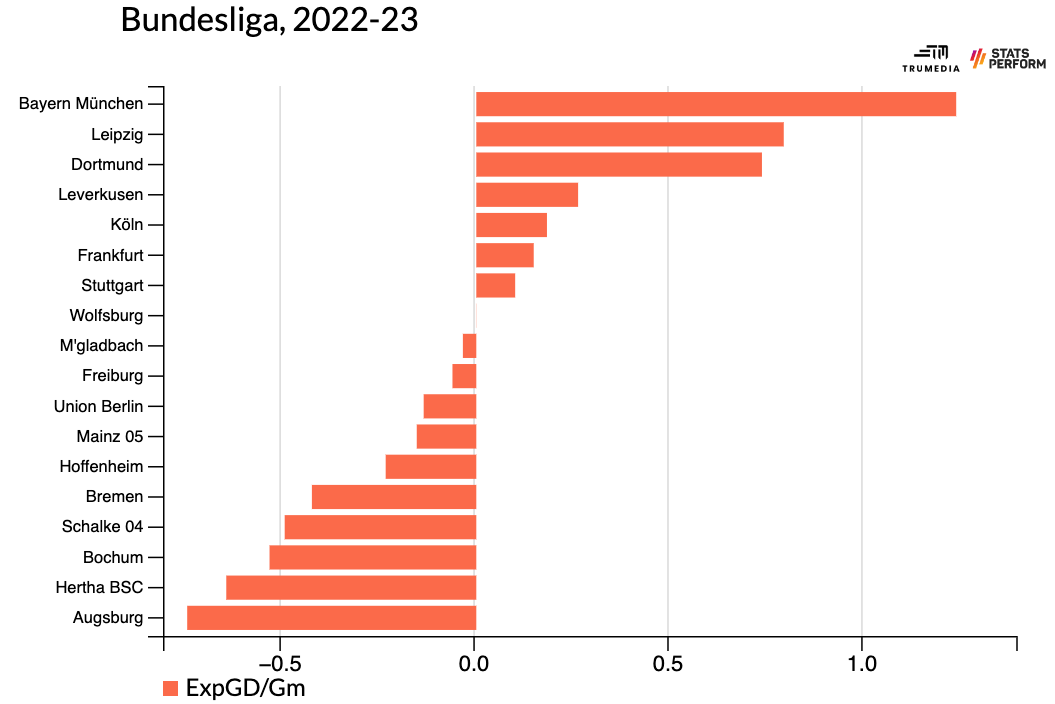
Now, this wasn't a vintage Bayern team by any means. Those Dortmund and RB Leipzig sides weren't vintage Dortmund and Leipzig sides either, and yet their performance levels were close enough to Bayern's that one of them was able to get hot and nearly steal last season's trophy. A reminder: Dortmund were knocked out of the Champions League by Graham Potter's Chelsea, while Leipzig lost on aggregate to Manchester City, 8-2.
Bayern should have the best goal and expected-goal differential in the Bundesliga every season -- such is the nature of their financial advantage over the rest of the league. Per FBref's estimates, their wage bill is double the size of Dortmund's second-largest Bundesliga payroll.
The way to judge Bayern domestically -- as much as we can judge Bayern domestically -- is not on trophies, but on the degree to which they're better than the rest of the league. The table currently tells us that ... they're failing.
In 2023-24, Bayern are two points back of first-place Bayer Leverkusen through nine games. However, they're nearly double the next-best team in non-penalty xG differential, which is much more predictive of future performance and indicative of true team quality than pure point totals at this stage of the season:
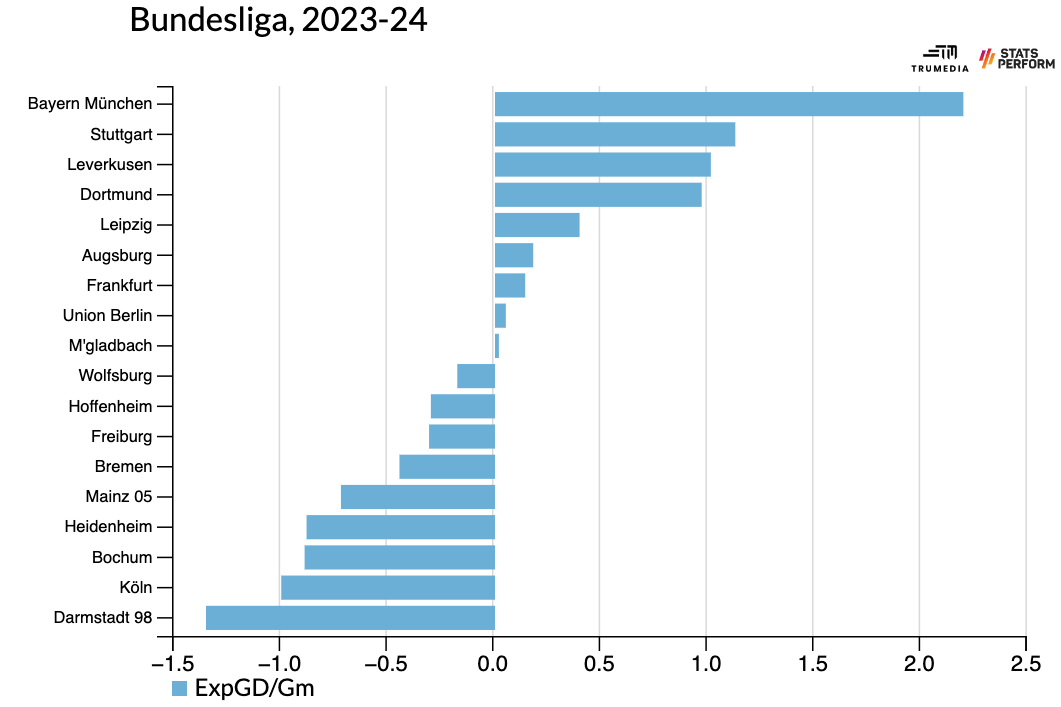
Last season, Bayern's big issue was that they didn't have a striker. Per Stats Perform, Eric Choupo-Moting played the most minutes (1,117) at center forward for them last season. He was 33 and hadn't played 1,000 minutes in a season since 2017-18 -- for Stoke City. The other three players to register at least 600 center-forward minutes were Serge Gnabry, Sadio Mané, and Thomas Müller -- three fantastic players who are not center forwards.
This summer, they added one of the three or four best strikers in the world when they signed Harry Kane, and he's even scoring goals from behind midfield:
With Kane now leading the line, Bayern are scoring nearly an extra non-penalty goal per game (3.4, up from 2.6) and creating significantly more non-penalty xG, too (2.8, up from 2.1). It's all pretty simple.
But Harry Kane is better with Bayern Munich, too
In his last season with Tottenham, Kane averaged 0.63 non-penalty expected goals plus assists per 90 minutes. With Bayern, he's currently averaging 1.12 npxG+A per 90 -- nearly double where he was last year.
Some of that is purely due to the difference in league quality. (See, again, who Dortmund and Leipzig lost to in the Champions League last season.) But most players only see a drop-off of a couple percentage points of xG when going from the Bundesliga to the Premier League -- we shouldn't expect Kane's output to nearly double when he heads in the opposite direction.
Of course, Bayern Munich are also a better soccer team than Tottenham -- both when compared directly to each other and when compared by their own relative strengths against the rest of their own domestic leagues. Wages, again, serve as a decent proxy for this. Bayern spend twice as much as any other team in Germany on wages. Tottenham's payroll is similar to Dortmund's, but it's also only the seventh-highest estimated payroll in the Premier League.
To get a sense of these team effects, we can look at how much of Kane's performance accounts for his team's total performance. When he was on the field at Tottenham last season, his non-penalty xG was 31.6% of the team's total xG and his expected assists were 11.7% of Tottenham's total. At Bayern, despite significant increases in his raw outputs for both metrics, his xG accounts for 27.5% of Bayern's total xG and his xA accounts for 10.5% of their total xA.
The way Bayern and Kane work together to make each other better is evident in how he's playing, too.
- Stream LIVE on ESPN+: Borussia Dortmund vs. Bayern Munich, Saturday, 1 p.m. ET (U.S.)
As I wrote about before the move to the Bundesliga happened, Kane had to reinvent himself in order to maintain his status as one of the best attackers in the world. After a lights-out 2017-18 season that saw him score a career-high 28 non-penalty goals as an in-and-around-the-box striker, Kane gradually started shooting much less often and began to dictate play from deep. Whether that was due to a number of injuries he suffered or the needs of the team, it happened, and it allowed him to eventually recreate his effectiveness from 2018 in a much different way.
Well, the Kane we're seeing this season is something of a hybrid of the two. Despite playing on a team with way more possession than Spurs had last year (up to 63% from 50%), Kane is touching the ball less often than in any of the past three seasons and at almost exactly the same rate he did in that 2017-18 season: 32.4 touches per 90 then, 32.2 touches per 90 now.
Here's where he took all of his touches last season at Tottenham:
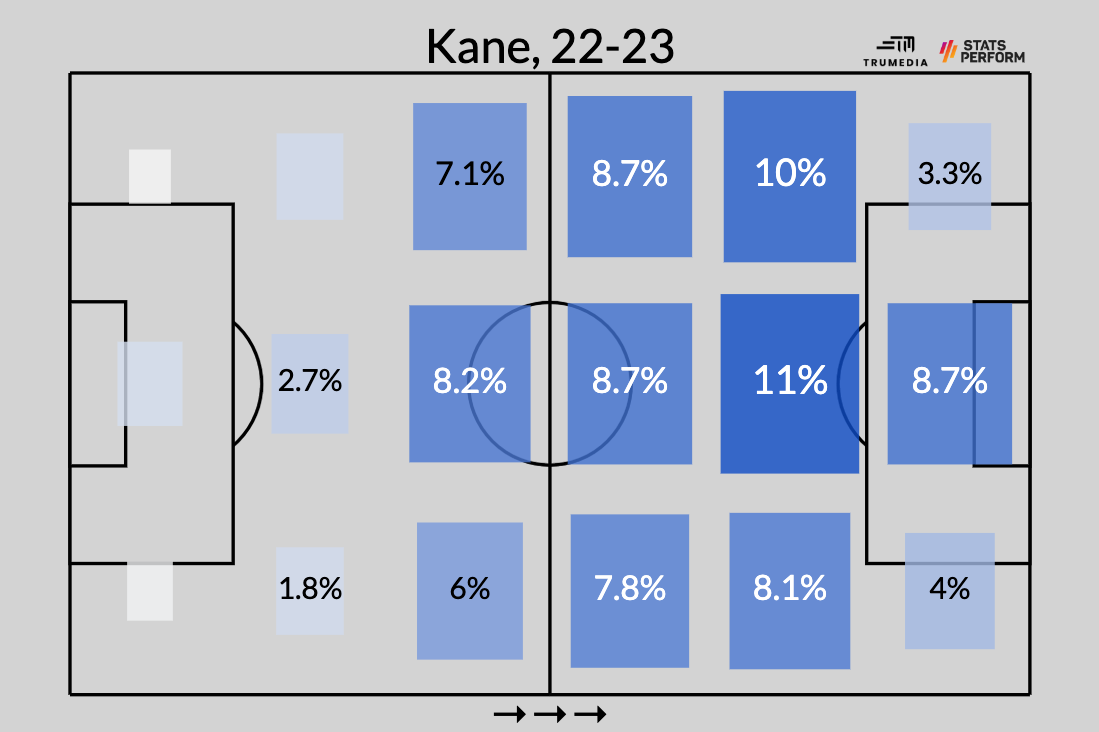
And here's where they're coming this year at Bayern Munich:
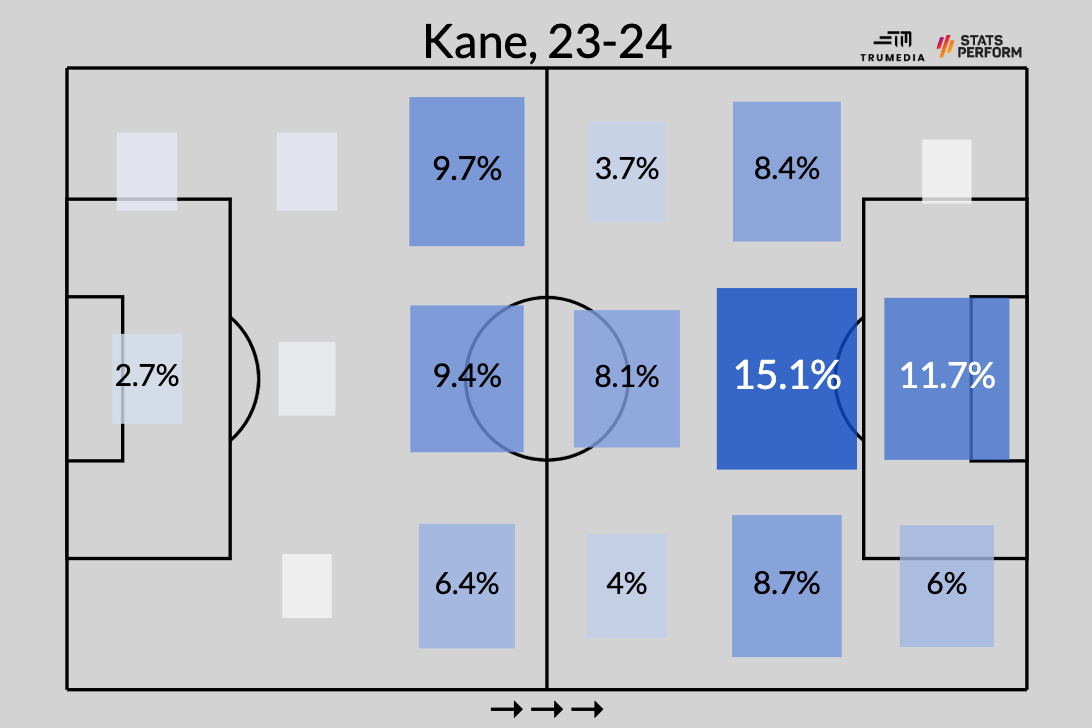
Last season, he was pretty much everywhere, sliding up, down and across the field to help Spurs generate possession that would eventually lead to attempts on goal. None of the nine sections of the attacking half accounted for more than 11% of his touches. Now, both the center of the box and the center of the final third just outside of the box each account for more than 11% of his touches.
FBref defines a progressive pass as such: "Completed passes that move the ball towards the opponent's goal line at least 10 yards from its furthest point in the last six passes, or any completed pass into the penalty area. Excludes passes from the defending 40% of the pitch." And Kane's progressive-pass rate (2.44 per 90) is lower now than in any season FBref has data for, starting in 2017-18. He's not helping Bayern move the ball up the field like he did for Spurs.
Meanwhile, Kane's shot rate (4.05 per 90) is higher now than it's been in any season since his career high of 5.3 in 2017-18. But in producing that, Kane rarely ever created anything for his teammates. He generated 2.7 expected assists over that entire 2017-18 season -- this season, he's already at 3.2 xA for Bayern through just nine games. These are all the chances he's created this season worth at least 0.05 xA:
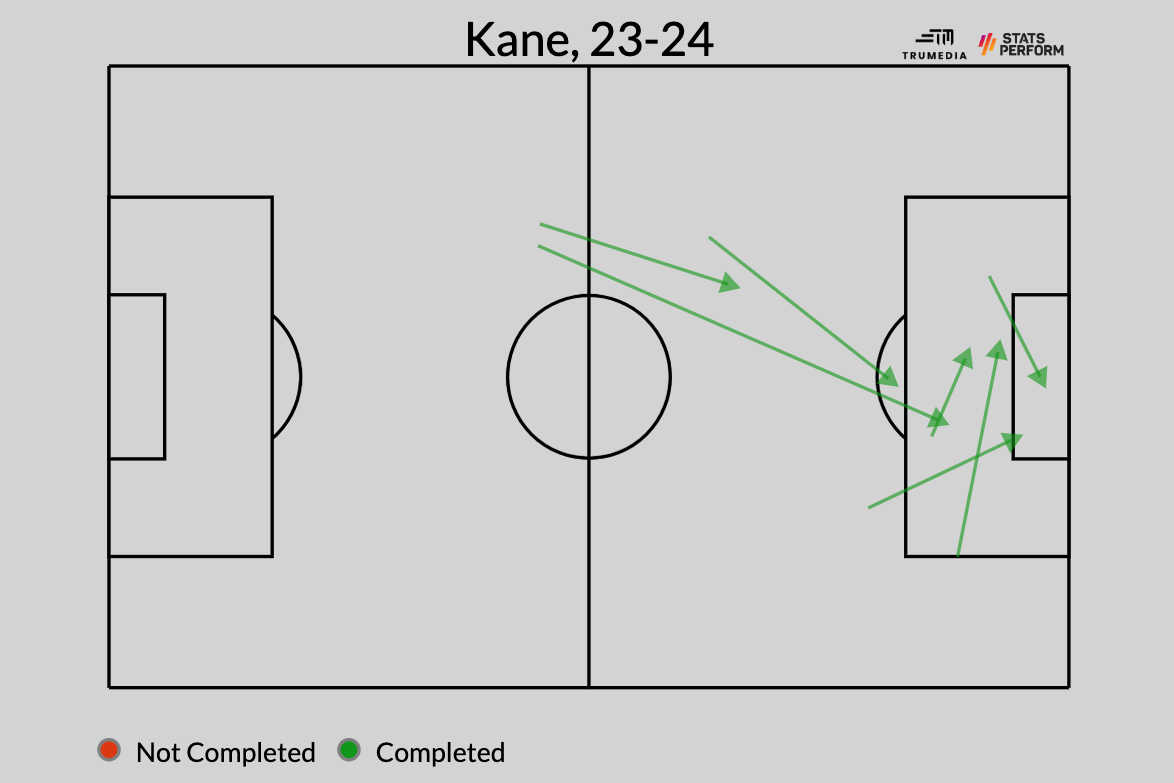
There are a couple more transitional moments -- the passes from near midfield -- coupled with creation from more settled possession near and inside the penalty area. As the touch map above showed, Kane is still dropping deep sometimes to aid in buildup. He's just doing it much less often.
It's almost as if Kane spent the last five years learning how to do all of the things he didn't do during the best goal-scoring season of his life. And now Bayern are asking him to just score goals again. He's doing that, sure, but he also didn't forget how to pass.
With Bayern coming off a shock loss to Saarbrucken in the DFB Pokal, they dominated Dortmund who are now five points back in the Bundesliga table. The gap between the two sides before Saturday's Der Klassiker might have felt tighter than it's been in a long time, but with Kane up top, doing everything he used to do and more, the distance between the two clubs is only likely to grow.
